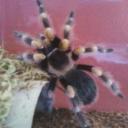Yahoo Answers is shutting down on May 4th, 2021 (Eastern Time) and the Yahoo Answers website is now in read-only mode. There will be no changes to other Yahoo properties or services, or your Yahoo account. You can find more information about the Yahoo Answers shutdown and how to download your data on this help page.
Trending News
Horse biting and pinning ears?
I recently bought a 15 year old mare at an auction for my 8 year old. I did speak and still speak to the seller. The mare has awesome foundation lines but had no idea when I bought her until I got her papers. Now that I have owned this mare for several weeks I have noticed that she pins her ears a lot and was told by the previous owner that the mare has done this since they have owned her also you see the whites in her eyes but the eye part is just part of her genetic make up. To me as a horse owner, pinned ears is a sign of aggression but until last night didn't believe she had a mean bone in her body. Well she bit me last night and it was an intentional bite to the chest. I was shocked at first and I know the 3 second rule and moved her off from her grain because that is all I had time for. Some people don't mess with their horses when they are eating and I agree that it's their personal time, however, there are times when you need to look them over when they are eating. I was standing in front of the mare when she bit and maybe that was an aggressive posture for her, but I have done this before, however I didn't try to touch her.
I am wanting more insight regarding this mares behavior. I've owned BLM Mustangs and other horses and have never encountered biting or the constant ear pinning. Like i've stated, I have an 8 year old daughter who I purchased this mare for and she loves this horse. I want them to have a long wonderful and healthy partnership. Selling this mare is not an option.
Thank You in advanced for any advice.
2 Answers
- SabethLv 58 years agoFavorite Answer
Does she only act this way when food is involved? If yes, there could be two things at work here. First, she may have been food-deprived at some point in her life and is now very protective of it; or she may have been permitted to get away with food aggression and now carries the dominant role. Mares are naturally dominant, but feeding time in general is when many horses will test their humans to see where they stand in the relationship.
Regardless of the reason, however, I would set a couple of very strict rules for feeding time: a) She may not come near you while you are carrying her food, and b) she must continue to keep her distance until you walk away. You can carry a rope with you, or a whip with a plastic bag tied to it, to drive her out of your space at feeding time. Be as assertive as you need to but no more, and go submissive when she backs up. After you set her food down, stand over it for a few seconds and gauge her actions. If she comes in too close, drive her away again. Even if, while she keeps her distance, her ears are still pinned, I would not worry about it...if you watch a herd of horses, you will often see that the less dominant horses may pin their ears even as they move away from the boss horse, simply voicing their impatience. As long as she is respecting your space, I would ignore any mean faces from her.
Outside of feeding time, anytime she lays her ears back at you or bites you, what I would do is immediately send her scrambling backwards and out of your space, fast. Fling your rope at her, "jump" in her direction, get her moving back energetically and for several steps. This tactic has never failed me and it beats physical punishment by a long run.
While it is necessary to periodically look our horses over, I would really try not to do it at feeding time. It's best to just leave horses alone while they are eating, since we humans would not like to be fussed with at our mealtimes, either. Her aggression might be her way of saying, "Let me eat in peace." You can do check-overs outside of feeding time.
Hope this helps you, feel free to email me with any other questions. Good luck!
Source(s): Natural horsemanship hobbyist :) - 8 years ago
Check her ears when you are able and see if she has ear mites. Animals may act aggressive when in pain.



